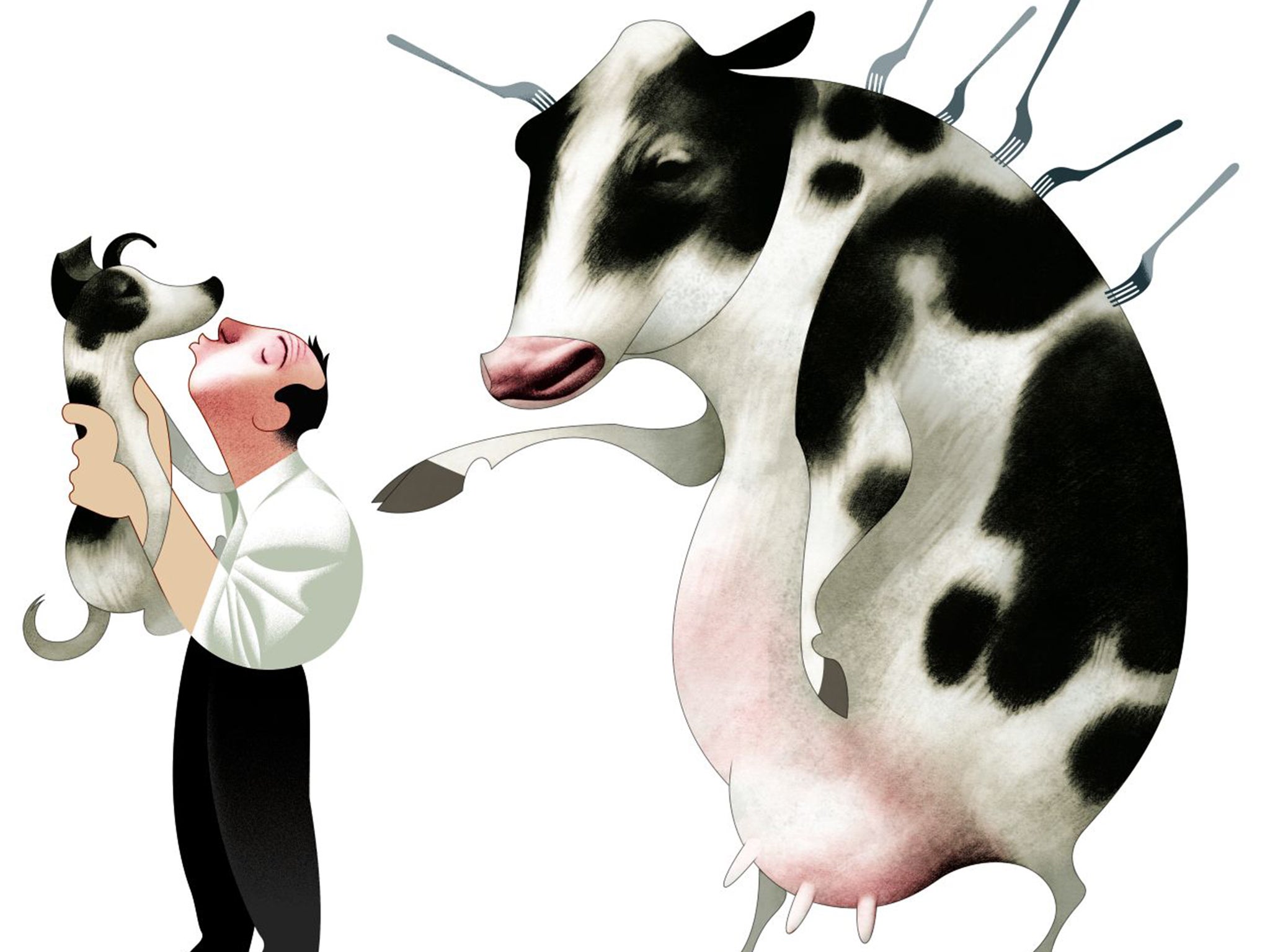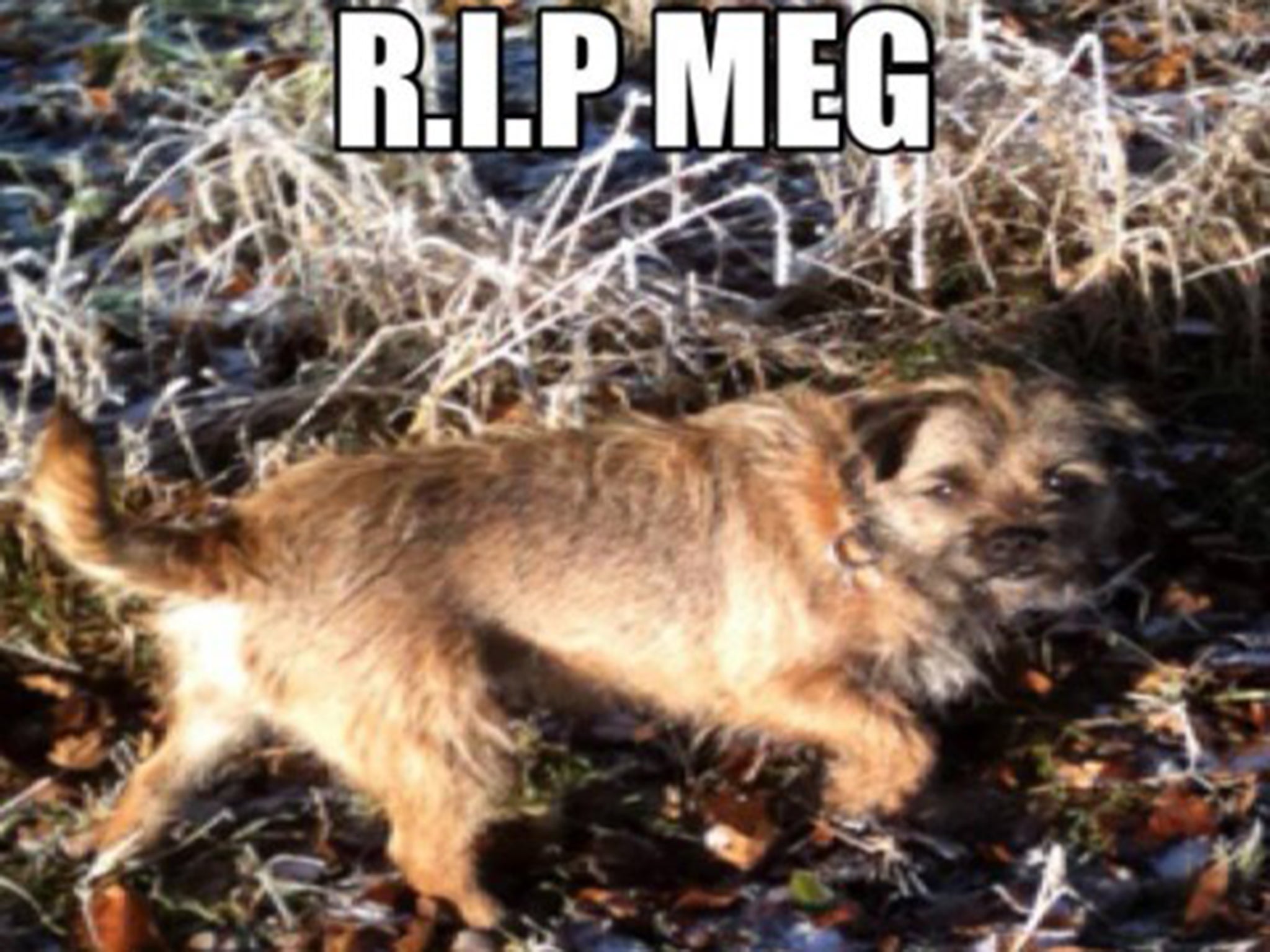A drowned terrier and vigils for cows: What does Britain's fixation with animals say about us?
The nation recoiled from cruelty against pets and livestock last week

Your support helps us to tell the story
From reproductive rights to climate change to Big Tech, The Independent is on the ground when the story is developing. Whether it's investigating the financials of Elon Musk's pro-Trump PAC or producing our latest documentary, 'The A Word', which shines a light on the American women fighting for reproductive rights, we know how important it is to parse out the facts from the messaging.
At such a critical moment in US history, we need reporters on the ground. Your donation allows us to keep sending journalists to speak to both sides of the story.
The Independent is trusted by Americans across the entire political spectrum. And unlike many other quality news outlets, we choose not to lock Americans out of our reporting and analysis with paywalls. We believe quality journalism should be available to everyone, paid for by those who can afford it.
Your support makes all the difference.Captain Stephen Woodhouse could not stand the way the dog next door kept yapping, so he drowned her in a bucket of water. “I reached my wits’ end,” the 52-year-old airline pilot told police. “All I could think of was that the noise had to stop. It was driving me bloody mad.”
The Flybe pilot was given a suspended sentence last week for killing the little terrier, but there were protesters outside the court wearing T-shirts demanding “Justice for Meg” and one of them said: “Should this man really be flying an aeroplane?”
This is one of the few places in the world where a question like that would even be asked in a case like this. People living in many other countries would wonder what all the fuss was about, and say it was only a dog after all. But in Britain, different rules apply. We know the British are nuts for their mutts (and cats and horses, rabbits, snakes and spiders and stick insects and anything else they can keep as pets and talk to, instead of to each other) but this weekend it feels truer than ever.

A candelit vigil was held on Friday night for a brown cow called Bessie who was shot by a police sniper. The same day there were reports of a soaring number of pets being given human-style funerals, with one crematorium handling 200 a week. The actress Joanna Lumley has revealed how she gives dog food to urban foxes, and even lets them come into her home. So this is the eccentric nation of animal lovers in which Captain Woodhouse lives and works, and in which he drowned a dog.
One senior member of cabin crew for an airline that is not Flybe told me he would go sick rather than fly with a pilot who had been convicted of something like that. “If he cannot control his temper and annoyance to a dog barking, then he certainly lacks the skills and patience which are called for when dealing with the public and flying a commercial airline.”
The Civil Aviation Authority said it looks into any case “in the event a licensed pilot is convicted of an offence which is relevant to their ability or duties”.
But is drowning a neighbour’s dog in a fit of rage an offence relevant to the ability or duties of an airline pilot? A CAA spokesman said: “That’s a very good question. I’ll have to get back to you.”
He didn’t, of course. The CAA investigates in private, quite rightly. But there are some parts of the world in which shutting up a noisy dog might seem trivial, or at least not as troubling as it does to the British. So would Mr Woodhouse still be flying if he had drowned a dog abroad, while working for a foreign airline?
Professor Robert Bor is the country’s leading aviation psychologist, and an expert on the way pilots think and behave. He says that in general in cases like this, three things have to be taken into account. “The first is that there is always more to a story than we can immediately see,” he said. “We don’t know what other details might be relevant, psychologically speaking. Secondly, these are jumpy times for pilots after what happened with Germanwings.”
That was back in March, when First Officer Andreas Lubitz crashed his Germanwings jet into a mountain in the French Alps and killed 149 passengers and crew in an apparent suicide and mass murder. He locked the cockpit door and took control of his passenger jet when the pilot went to the toilet. Since then there has been a much greater focus on what may be going on in the minds of the men and women in the cockpit.
“People are looking at pilots in a way they might not have done before,” says Professor Bor. “Previously they were seen as an extension of the plane, almost inanimate objects. They were assumed to be calm under fire in very difficult circumstances, able to lead and not subject to their feelings.”
Now they are being seen as humans again, and humans can be flawed. But what has a crime committed in the back garden got to do with work?
“Thirdly, he has acted outside of the law. Pilots are required to work within standard operating procedures, air law and so on. Anyone acting outside of that in another part of their life will draw attention to themselves,” said Professor Bor. US pilots are screened for minor offences such as speeding. “If someone is acting outside the law in one context, the question will be asked, ‘Could this transfer and translate?’”
In other words, if they break the rules off duty – in however small a way – would they be inclined to do it at work too? That’s not about the dog so much as the letter of the law.

There’s another dimension to this, though. Airlines don’t like pilots acting “outside of the norm”, said Professor Bor. It worries them. They don’t want to give control of a jet to someone who is going to behave unpredictably.
Regardless of how serious a crime it is to kill a dog, it is certainly outside the norm in this country. But then our norm is unique when it comes to affection for animals.
Take the reaction to the death of Bessie the brown cow, a victim – some say – of police brutality. She escaped from a country park on North Tyneside after being spooked by a dog and was hunted by a massive police force of 20 cars, a helicopter and six police marksmen.
They could have tranquillised her. They could have got a farmer in to round her up. But no, they shot poor Bessie down. The gentle-looking creature was deemed to be “highly distressed” and a danger to the public, so she was killed by a police sniper.
“The cow wasn’t doing anything. She was just eating a bit of grass,” said Dave Taylor, who started a Facebook page in her memory. Sympathy and outrage were expressed along with a few dodgy jokes: “To anyone who has a beef with this page – burger off if you don’t like it.”
Mourners were called to a candlelit vigil on Friday night at the field in Wallsend where Bessie fell. They were asked to wear black-and-white cow-print onesies.
She will have ended up at an abattoir, and not at one of the 50 or so pet crematoriums that are now operating around the country, as was revealed by the BBC while all this was going on. The one in Penwith, Cornwall, will bury your horse too, if you pay them £900. (Dobbin is too big to burn.)

And then there is Lumley, who took animal-loving to new extremes at the Chelsea Flower Show when she confessed to feeding those skanky villains, the city foxes. “When my husband [conductor Stephen Barlow] leaves the music room door open, they come in and sit on the sofa. One came in while he was practising. Like a little dog, she just sat there and listened to him playing.”
There are 65 million pets in Britain, which is almost one for each of us. (In fact, about half of households have them.) More than eight million dogs, more than eight million cats. The RSPCA, which brought the case against Captain Woodhouse, receives more than £100m a year in donations.
Meg was no ordinary pet. “We got Meg as an eight-week-old puppy for our daughter who was special needs, as a companion,” said Alan Boddington. “She became a very important part of our family. We have got lots of memories of Lauren and Meg together. It has absolutely traumatised the children and all of us we are very upset.”
Lauren was only 10 years old when she died in 2009. Alison Boddington said: “Meg was Lauren’s dog. She was the one thing we had left of Lauren. For us that makes it worse. We are truly devastated.” Sara-Lise Hawe, defending Mr Woodhouse in court, said he had been under stress at work and had suffered a heart attack in 2013. The dog barked from morning to night in the garden near to his in Long Buckby, Northamptonshire, she said. “Mr Woodhouse is not a man who likes to complain but he had spoken to the council and he was at his wits’ end.”
Mrs Hawe described her client’s actions as “a momentary lapse of sanity with long-term consequences”.
Stephen Woodhouse told police that he walked over to the fence, whistled to the dog and it trotted over to see him. “When it got to the fence, I picked it up and walked back across my paddock. There was some building work being done and a big bucket of water, so I stuck it in the bucket until it stopped moving. I never thought of the consequences.” The court heard that he put the body in a bag and drove to a hedgerow to bury and hide it there. According to reports, Mr Woodhouse then flew a passenger plane capable of carrying 70 passengers from Birmingham airport to the Isle of Man and back, before returning to the dog. He cut Meg’s electronic chip out of her body then drove to a different location and hid her again.

The Boddingtons called on friends and neighbours to search for Meg, and this went on for three days. The police were called when a suspicious Mrs Boddington looked in the boot of her neighbour’s car and saw dog hairs.
The pilot pleaded guilty to a charge of causing unnecessary suffering to an animal resulting in its death. He was sentenced to 12 weeks in prison suspended for two years and ordered to pay £2,400 in costs as well as a victim surcharge of £80. He said: “I can’t believe I have caused a nice family so much suffering and grief.”
Flybe says it is taking the matter “extremely seriously” and has suspended the pilot while there is a full investigation. A spokesperson told The Independent on Sunday: “Flybe is genuinely appalled at the nature of this situation and has expressed its sincerest empathy to the family over the distressing loss of this special dog.”
The question the protesters asked was a fair one, in a nation of dog-lovers. But the hard truth is that what happens next has got nothing to do with Meg, or the strong feelings her murder has provoked. It’s just about the state of a man’s mind – and the answers to those kinds of questions are impossible to predict.
Twitter: @ColeMoreton
Join our commenting forum
Join thought-provoking conversations, follow other Independent readers and see their replies
Comments